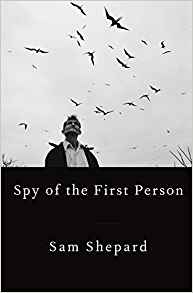 Sam Shepard, Spy of the First Person (New York: Knopf, 2017), 82pp.
Sam Shepard, Spy of the First Person (New York: Knopf, 2017), 82pp.
When Sam Shepard died on July 27, 2017 from complications of Lou Gehrig's Disease at the age of seventy-three, he was remembered as one of the most influential voices of our time. Once described as "the greatest American playwright of his generation" (some fifty-five plays), Shepard was also an actor who appeared in sixty films, a screenwriter, memoirist, and director. In 1979 he won the Pulitzer Prize for his play Buried Child.
This posthumous novella is the last thing that Shepard wrote. In a brief note at the end of the book, we learn that he began work on the book in 2016, writing the first drafts by hand, since his ALS prevented him from typing. When writing by hand became impossible, he recorded his thoughts, which his family then transcribed. When recording became too laborious, he dictated the remainder of the book. His lifelong friend and fellow artist Patti Smith helped him to edit the manuscript, which he reviewed only a few days before he died.
In this book an unnamed narrator shares his memories about family, work, travel, and simple but deeply human observations of all sorts. There are places like New Mexico and New York City, the smells of a Berkeley coffee shop, the sounds of birdsong, family members like his grandparents Aubra and Jay, immigrants waiting on a corner for some work, a certain model of car from decades gone by, a mere gesture, and a recurring old man on a porch. Is all this autobiographical? Some of it seems to be. The narrator is definitely sick and receiving treatment: "They give me all these tests. Way out in the desert."
Some of these memories bring joy, others pain and sorrow. Most of all they are poignant mixture of both for a narrator who is near death: "There are times that I can't help thinking about the past. I know the present is the place to be. It's always been the place to be. I know I've been recommended by very wise people to stay in the present as much as possible, but the past sometimes presents itself. The past doesn't come as a whole. It always comes in parts. In fact it comes apart. It presents itself as though it was experienced in fragments."


